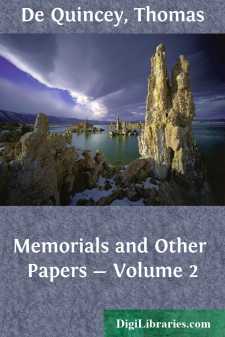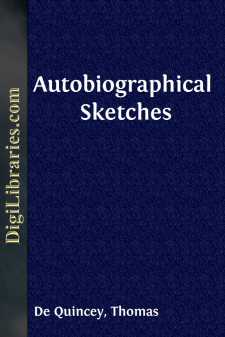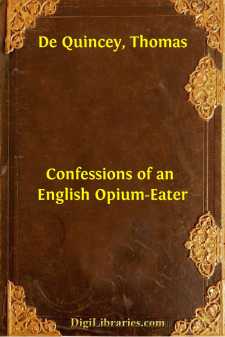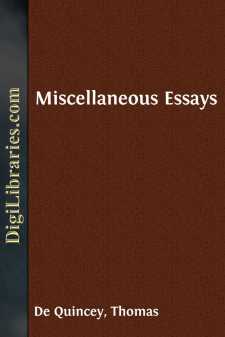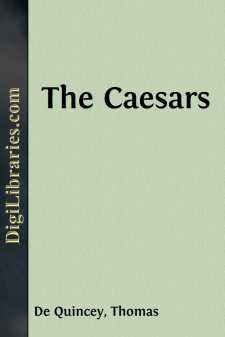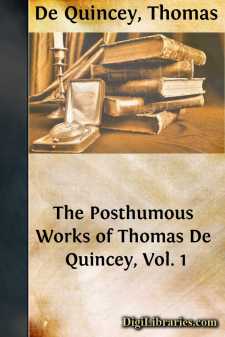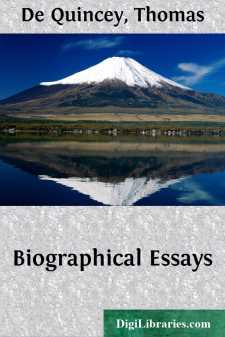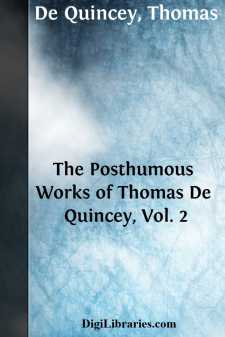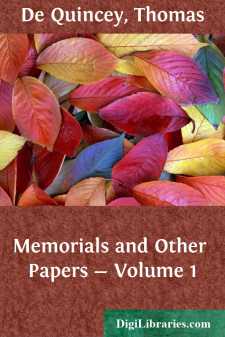Categories
- Antiques & Collectibles 13
- Architecture 36
- Art 48
- Bibles 22
- Biography & Autobiography 813
- Body, Mind & Spirit 142
- Business & Economics 28
- Children's Books 13
- Children's Fiction 10
- Computers 4
- Cooking 94
- Crafts & Hobbies 4
- Drama 346
- Education 46
- Family & Relationships 57
- Fiction 11828
- Games 19
- Gardening 17
- Health & Fitness 34
- History 1377
- House & Home 1
- Humor 147
- Juvenile Fiction 1873
- Juvenile Nonfiction 202
- Language Arts & Disciplines 88
- Law 16
- Literary Collections 686
- Literary Criticism 179
- Mathematics 13
- Medical 41
- Music 40
- Nature 179
- Non-Classifiable 1768
- Performing Arts 7
- Periodicals 1453
- Philosophy 64
- Photography 2
- Poetry 896
- Political Science 203
- Psychology 42
- Reference 154
- Religion 513
- Science 126
- Self-Help 84
- Social Science 81
- Sports & Recreation 34
- Study Aids 3
- Technology & Engineering 59
- Transportation 23
- Travel 463
- True Crime 29
Thomas De Quincey
Thomas De Quincey (1785-1859) was an English essayist best known for his autobiographical work, "Confessions of an English Opium-Eater," which explores his experiences with opium addiction and its impact on his life and work. A key figure in the Romantic movement, De Quincey's writings combine rich, lyrical prose with keen psychological insight. His contributions to literature also include critical essays and works on philosophy and political economy, influencing both his contemporaries and later writers.
Author's Books:
Sort by:
CHAPTER I. The winter of 1633 had set in with unusual severity throughout Suabia and Bavaria, though as yet scarcely advanced beyond the first week of November. It was, in fact, at the point when our tale commences, the eighth of that month, or, in our modern computation, the eighteenth; long after which date it had been customary of late years, under any ordinary state of the weather, to extend the...
more...
MY DEAR SIR: I am on the point of revising and considerably altering, for republication in England, an edition of such amongst my writings as it may seem proper deliberately to avow. Not that I have any intention, or consciously any reason, expressly to disown any one thing that I have ever published; but some things have sufficiently accomplished their purpose when they have met the call of that...
more...
I here present you, courteous reader, with the record of a remarkable period in my life: according to my application of it, I trust that it will prove not merely an interesting record, but in a considerable degree useful and instructive. In that hope it is that I have drawn it up; and that must be my apology for breaking through that delicate and honourable reserve which, for the most part, restrains...
more...
ON THE KNOCKING AT THE GATE, IN MACBETH. From my boyish days I had always felt a great perplexity on one point in Macbeth. It was this: the knocking at the gate, which succeeds to the murder of Duncan, produced to my feelings an effect for which I never could account. The effect was, that it reflected back upon the murder a peculiar awfulness and a depth of solemnity; yet, however obstinately I...
more...
THE CÆSARS. The condition of the Roman Emperors has never yet been fully appreciated; nor has it been sufficiently perceived in what respects it was absolutely unique. There was but one Rome: no other city, as we are satisfied by the collation of many facts, either of ancient or modern times, has ever rivalled this astonishing metropolis in the grandeur of magnitude; and not many—if we except the...
more...
GENERAL INTRODUCTION. These articles recovered from the MSS. of De Quincey will, the Editor believes, be found of substantive value. In some cases they throw fresh light on his opinions and ways of thinking; in other cases they deal with topics which are not touched at all in his collected works: and certainly, when read alongside the writings with which the public is already familiar, will give...
more...
SHAKSPEARE.[Endnote: 1] William Shakspeare, the protagonist on the great arena of modern poetry, and the glory of the human intellect, was born at Stratford-upon-Avon, in the county of Warwick, in the year 1564, and upon some day, not precisely ascertained, in the month of April. It is certain that he was baptized on the 25th; and from that fact, combined with some shadow of a tradition, Malone has...
more...
INTRODUCTION. All that needs to be said in the way of introduction to this volume will best take the form of notes on the articles which it contains. I. 'Conversation and S. T. Coleridge.' This article, which was found in a tolerably complete condition, may be regarded as an attempt to deal with the subject in a more critical and searching, and at the same time more sympathetic and inclusive...
more...
Many of the papers in my collected works were originally written under one set of disadvantages, and are now revised under another. They were written generally under great pressure as to time, in order to catch the critical periods of monthly journals; written oftentimes at a distance from the press (so as to have no opportunity for correction); and always written at a distance from libraries, so that...
more...
VISIT TO LAXTON. My route, after parting from Lord Westport at Birmingham, lay, as I have mentioned in the "Autobiographic Sketches," through Stamford to Laxton, the Northamptonshire seat of Lord Carbery. From Stamford, which I had reached by some intolerable old coach, such as in those days too commonly abused the patience and long-suffering of Young England, I took a post-chaise to Laxton....
more...


